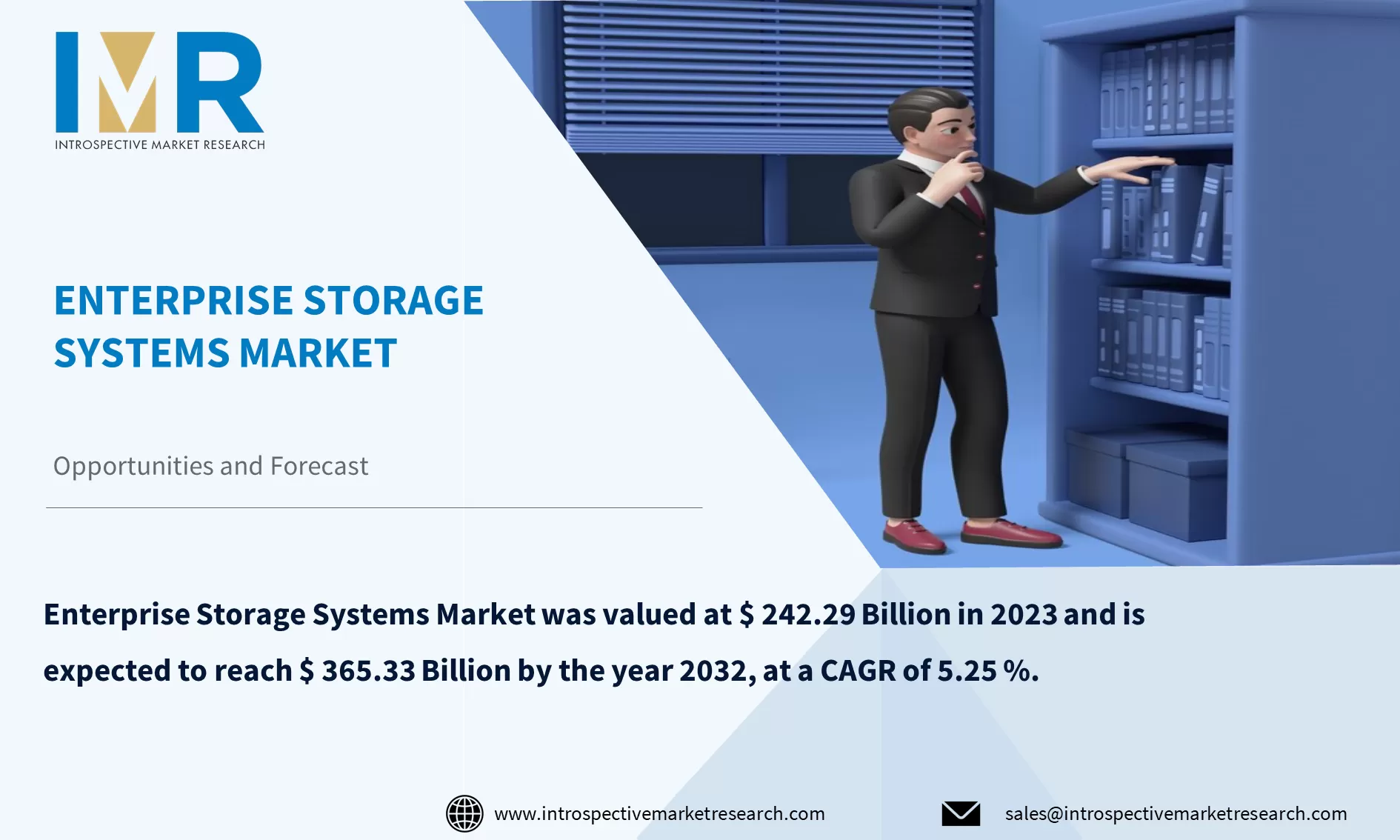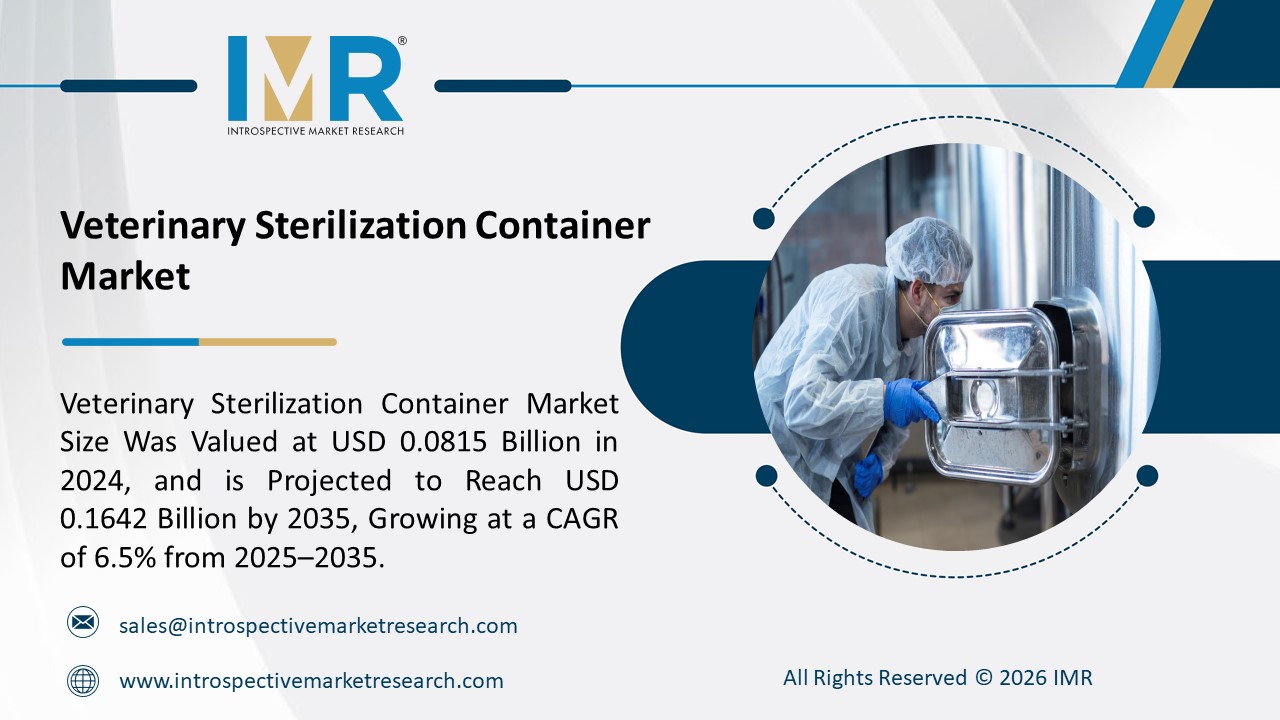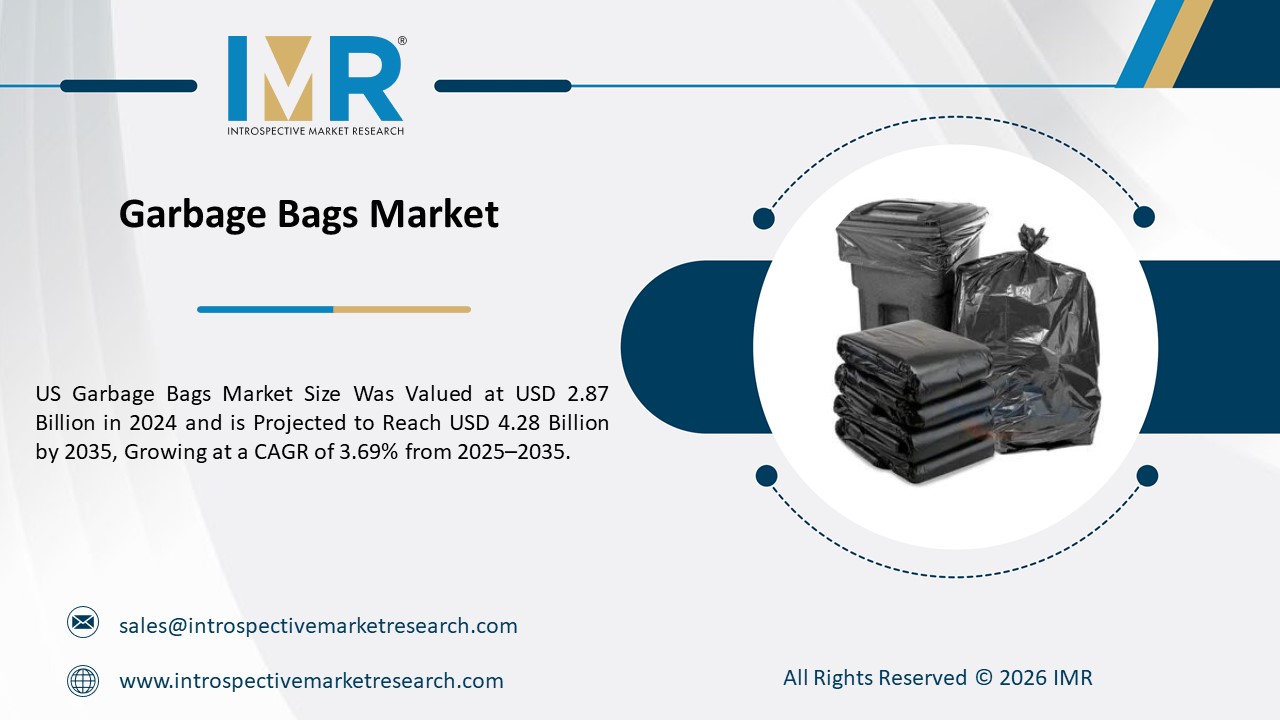Enterprise Storage Systems Market
According to a new report published by Introspective Market Research, titled, ?Enterprise Storage Systems Market by Type, Deployment Mode, Enterprise Size, Storage Technology, End-User, Region Global Market Analysis and Forecast, 2024-2032.
The Global Enterprise Storage Systems Market was valued at $ 242.29 Billion in 2023 and is expected to reach $ 365.33 Billion by the year 2032, at a CAGR of 5.25 %.
Enterprise storage systems are advanced infrastructure solutions designed to store, manage, and protect vast amounts of data for organizations. They utilize technologies like cloud storage, software-defined storage, and high-speed storage arrays to ensure secure and efficient data storage and retrieval. These systems are widely used across industries for data-intensive operations and digital transformation initiatives. They store and manage large volumes of structured and unstructured data, including databases, files, multimedia content, and business applications. They provide a centralized and scalable storage infrastructure that enables efficient data access, backup, recovery, and archival processes. Technologies like flash storage, data deduplication, encryption, and automated tiering optimize storage efficiency, reduce latency, and ensure data integrity and security. The demand for advanced storage solutions is driven by factors such as the exponential growth of data, emerging technologies like AI and IoT, and evolving business requirements for real-time data processing and insights.
According to Enterprise Storage Systems, the Market is segmented into Type, Deployment Mode, Enterprise Size, Storage Technology, End-User, and region. By Type, the market is categorized into Storage Area Network (SAN), Network Attached Storage (NAS), Direct Attached Storage (DAS), and Hybrid Storage. By Deployment Mode, the market is categorized into On-Premises and Cloud-based. By Enterprise Size, the market is categorized into Small and Medium Enterprises (SMEs) and large Enterprises. By Storage Technology, the market is categorized into Hard Disk Drives, Solid-State Drives, and Hybrid Storage Arrays. By End-User, the market is categorized into Banking, Financial Services & Insurance (BFSI), Retail, Information Technology & Telecommunications, Healthcare, and Government & Utilities By region, it is analyzed across North America (U.S.; Canada; Mexico), Eastern Europe (Bulgaria; The Czech Republic; Hungary; Poland; Romania; Rest of Eastern Europe), Western Europe (Germany; UK; France; Netherlands; Italy; Russia; Spain; Rest of Western Europe), Asia-Pacific (China; India; Japan; Southeast Asia, etc.), South America (Brazil; Argentina, etc.), Middle East & Africa (Saudi Arabia; South Africa, etc.).
The growing demand for data security and regulatory compliance is driving the growth of the enterprise storage systems market. Organizations are prioritizing data security to protect sensitive information from cyber threats and unauthorized access. Advanced storage solutions equipped with robust encryption, access controls, and security protocols are being adopted to ensure data confidentiality, integrity, and availability. Businesses are investing in compliance-specific features like audit trails, data retention policies, data masking, and secure data disposal mechanisms to meet regulatory obligations and mitigate risks effectively. The convergence of data security and compliance requirements is driving innovation in the storage industry, with vendors continuously enhancing their offerings to address evolving cybersecurity threats and regulatory landscapes.
Hyperconverged Infrastructure (HCI) is a growing trend in the enterprise storage systems market, as it integrates computing, storage, networking, and virtualization capabilities into a unified platform. This offers simplified management, scalability, and cost efficiencies. As businesses adopt HCI solutions, there is a growing demand for advanced storage systems that can integrate seamlessly with HCI environments, providing enhanced storage performance and flexibility. HCI solutions also enable organizations to leverage software-defined storage (SDS) capabilities, allowing greater flexibility and control over storage policies, performance tuning, and data protection. This convergence creates opportunities for storage vendors to innovate and deliver tailored solutions, driving growth and competitiveness in the market.
Enterprise Storage Systems Market Segmentation
The Enterprise Storage Systems Market is Segmented Based on Type, Deployment Mode, Enterprise Size, Storage Technology, End-User, and Region.
By Type:
The Storage Area Network (SAN) segment is expected to dominate the enterprise storage systems market due to its dedicated network infrastructure, high-speed data transfers, centralized storage management, and scalability. As organizations increasingly rely on data-intensive applications, virtualization technologies, and cloud services, the demand for SAN solutions is increasing. SANs offer features like Fibre Channel and iSCSI protocols, storage virtualization, and tiered storage architectures, making them suitable for database management systems, high-performance computing clusters, and ERP applications. Advancements in SAN technologies further enhance their appeal.
By Application:
The cloud-based segment is the leading player in the enterprise storage systems market, offering scalable, on-demand storage solutions without extensive on-premises infrastructure. The increasing adoption of cloud computing has driven demand for these solutions due to cost efficiencies, agility, and scalability benefits. Cloud-based storage provides flexible capacity, allowing businesses to scale resources based on changing needs, optimizing costs, and accommodating fluctuating data storage requirements. It also offers data redundancy, backup, and disaster recovery capabilities, enhancing data protection and business continuity.
Region:
North America is expected to dominate the enterprise storage systems market due to its strong presence of major technology companies, robust IT infrastructure, and high adoption rates of advanced storage technologies. The mature market ecosystem and focus on digital transformation fuel demand for innovative storage solutions. The region's supportive regulatory environment, favorable economic conditions, and well-established cloud computing landscape contribute to widespread adoption. The region's leadership in finance, healthcare, manufacturing, and technology drives substantial data generation and storage requirements, requiring scalable, secure, and efficient storage solutions.
Some of The Leading/Active Market Players Are-
- Dell Technologies (U.S.)
- Hewlett Packard Enterprise (HPE) (U.S.)
- NetApp (U.S.)
- IBM Corporation (U.S.)
- Cisco Systems (U.S.)
- Pure Storage (U.S.)
- Hitachi Vantara (U.S.)
- Western Digital Corporation (U.S.)
- Cohesity (U.S.)
- Nutanix (U.S.) and Other Active Players
Key Industry Developments
- In February 2024, Hewlett Packard Enterprise announced Release 3 of HPE GreenLake for Block Storage, based on HPE Alletra Storage MP ? the industry?s first scale-out disaggregated block storage that enables enterprises to scale capacity and performance independently. Powered by a shared-everything storage architecture, and managed via the HPE GreenLake Cloud Platform, this unique block storage offering brings an on-premises cloud experience, efficient scale, and extreme resiliency and performance to modern mission-critical workloads.
- In February 2023, NetApp a global, cloud-led, data-centric software company, announced the availability of NetApp Advance, a new portfolio of storage programs and guarantees to help customers cost-effectively future-proof on-premises environments.
Key Findings of the Study:
- The Storage Area Network (SAN) segment is expected to dominate due to its high-speed data transfers, centralized storage management, and scalability, making it suitable for data-intensive applications.
- The cloud-based segment leads the market, providing scalable, on-demand storage solutions that offer cost efficiencies, agility, and data redundancy.
- North America is projected to dominate the market due to its strong presence of major technology companies, robust IT infrastructure, and high adoption rates of advanced storage technologies.






